Looking after mental health in recovering communities
16 November 2023
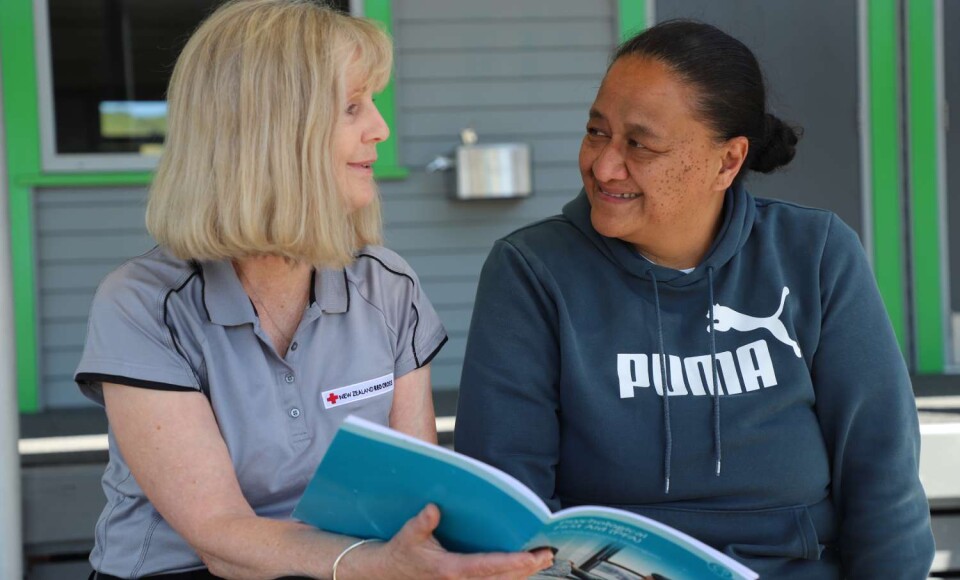
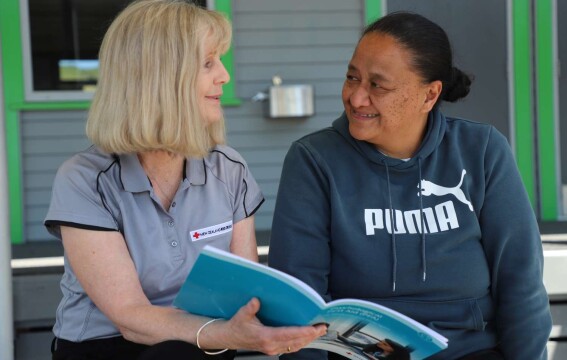
Update 14: New Zealand Disaster Fund
In this update, we focus on our work supporting mental health in recovering communities and check in on three community grant recipients. We also give an update on our Home Bundles initiative and report on our Resilience Investment Programme.
On this page:
- Home Bundles and Resilience Investment Programme update
- One thousand people trained in Psychological First Aid
- Supporting mental health education in Hawke's Bay schools
- A great start for new babies in Cyclone-hit communities
- Digging in to help those still cleaning up
- By the numbers
The New Zealand Disaster Fund has now committed nearly $24 million to helping people and communities affected by Cyclone Gabrielle and other severe weather events earlier this year. The entire $28 million Fund will be committed by the one-year anniversary of the cyclone in February 2024.
We’re currently focused on the New Zealand Red Cross Home Bundles initiative and on building resilience in affected communities through our Resilience Investment Programme.
Home Bundles
Losing all your possessions in a flood is devastating, especially when you have no means to replace them.
The New Zealand Red Cross Home Bundles programme has committed around $6.3 million to helping those most in need to refurnish their homes with new basic items such as whiteware and bedding. We’re working with local partners to connect with around 600 vulnerable families to help them re-establish their homes.
Talking about the programme, General Manager Emergency Management Sean Stewart said, “we’re excited to say we’ve already helped kit out 50 households, and we’re processing orders for around a further 200. With hundreds of families still waiting to either return to their homes or find suitable accommodation, this is a long-term programme and we’ll be here and ready when people need us.”
Preparing for next time – resilience grants
We know that communities devastated by the severe weather events want – and need – to be better prepared for the next time. Our Resilience Investment Programme is now well underway with nearly $2 million in grants to affected communities for emergency preparedness.
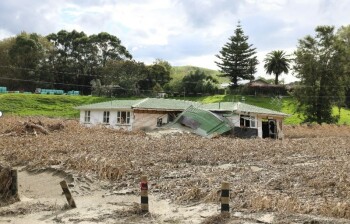
Helping communities get better prepared for another disaster is an important part of healing and recovery
A further $2 million will be spent helping local emergency hubs get better equipped. This funding is for equipment such as generators, satellite phones and radios, first aid supplies, emergency bedding, and Psychological First Aid and First Aid training.
Some funding will also go to replacing equipment used in the response by our volunteer Disaster Welfare and Support Teams, and building their capability in the affected areas.
We’ll be distributing a total of around $6 million in resilience funding from the New Zealand Disaster Fund over the next few months.
One thousand people trained in Psychological First Aid
In early March 2023, just weeks after Cyclone Gabrielle, our New Zealand Red Cross psychosocial team began holding workshops in some of the country’s hardest-hit areas.
“There was huge need for psychosocial support, because people were not only living their own experience of it, but also having to support and look after others around them in their whānau and their social networks,” said Ali Souch, our Team Leader for Psychosocial Training.
Since then, we have trained 1,001 people in affected areas in Psychological First Aid. Many trainees were directly impacted by the disaster themselves. Others are in community roles where they have been helping support people through immense distress.
Pimia Wehi (Te Aitanga a Mahaki) is Community Co-Lead for Cyclone Recovery in the small rural settlement of Te Karaka, where more than 100 families lost homes during the cyclone. “The psychological first aid training, which I was a participant in, allowed us for the first time to discuss, to break down, the events of what happened during that whole Gabrielle ordeal,” said Pimia.
Read Pimia’s full story: Recovering peace of mind
New Zealand Red Cross psychosocial advisor Sarah Gribbin explains that as with medical first aid training, having people in communities who are equipped to provide emotional and mental support to those who’ve experienced a traumatic event can be incredibly valuable and sometimes even lifesaving. “We know that there will unfortunately be more disasters in New Zealand – so the more people we can train in PFA, the more resilient communities will be.”
Until the end of October 2023, this mahi | work has been supported by the New Zealand Disaster Fund and courses have been free of cost to participants in areas affected by the cyclone and floods.
We have now scheduled regular public courses around New Zealand for 2024. From this month onwards, individuals and groups can book PFA courses with us through our website.
Mental health and wellbeing courses
Supporting mental health education in Hawke's Bay schools
Five years ago, Sir John Kirwan was reflecting on his mission to improve mental health in Aotearoa New Zealand. Despite his ground-breaking work raising national awareness around depression and mental health, he strongly felt there needed to be more proactive interventions to help prevent mental health needs from escalating. He started working with the University of Auckland to develop an evidence-based, school-wide approach to mental health – the first of its kind in the world. The Sir John Kirwan Foundation began trialling the “Mitey” programme in 2020, and it’s now being used in over 130 schools around New Zealand.
Sir John Kirwan Foundation’s Head of Partnerships, Simon Keeley says prior to the cyclone, they had been planning to work in Hawke’s Bay, but it was fast-tracked because there was such a need there. “Schools asked, ‘can you come down a bit earlier?’ The funding we received from Red Cross enabled us to do that, which was great."
A $164,000 grant from the New Zealand Disaster Fund has allowed the Mitey team to roll out the programme to nine schools in Hawke’s Bay this year. This is part of the more than $1.8 million in grants from the New Zealand Disaster Fund that have been dedicated to bolstering mental wellbeing in communities affected by Cyclone Gabrielle and the severe weather events of early 2023.
A dedicated Mitey coach is working with teachers, who then implement the programme by integrating it into their curriculums for Years 1 to 8. Schools can customise the programme based on their specific circumstances and needs – something that’s particularly useful as Hawke’s Bay schools manage the impact of heightened anxiety and ongoing family stress that many children are experiencing after the cyclone.
The Mitey team will also be looking at lessons from their work in Hawke’s Bay to see if there are ways to further tailor the approach for school communities that go through any disasters in the future.
A great start for new babies in Cyclone-hit communities
As joyous as having a new baby is, there can be tough times too, and for some families who welcomed their new arrival during or soon after Cyclone Gabrielle, there was a whole new layer of worry.
To help ease the way for families in Hawke’s Bay and Tairāwhiti, we gave BabyStart Charitable Trust a $16,000 grant from the New Zealand Disaster Fund to help them provide boxes of baby essentials to those most in need.
BabyStart has worked with maternity healthcare providers to get the boxes of high-quality baby clothing, care products, a toy and book, and other useful items out to families.
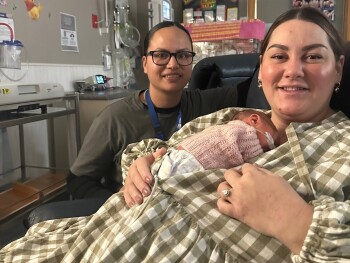
Renee and her new-born baby Summer with their Breastfeeding Kaiāwhina Kiriana August
Renee Makea received one of these boxes when she welcomed her new baby Summer. Renee was pregnant and living in Eskdale on the night the cyclone hit Hawke’s Bay. As she was cooking dinner, her partner went to check the Esk River. He came running back to the house saying the water was lapping over the stop bank.
The couple and their older child left their home with just one packed bag. When they returned, they found water and silt had filled their house almost up to the ceiling. Everything they owned was lost. There were more worrying times when baby Summer arrived early and needed time in the Special Care Baby Unit. Renee and her family appreciated the baby box and they are now in a new home and are rebuilding their lives.
The BabyStart boxes have been delivered to parents of newborns facing a range of challenges after the cyclone. Some were even picked up on horseback to be given to affected whānau in Ruatoria and Wharekahika where roads had been cut off after the flooding. Te Whatu Ora staff from Tairāwhiti have shared feedback saying they love being able to see the looks on the faces of women, “who have nothing and cannot believe that someone has thought of them and then they open the boxes and the realisation that they have quality items for their newborn pēpi.”
Digging in with Red Cross support
“You should see the looks on people’s faces when you show up with a digger. It sounds like a little thing, but it’s huge.”
After Cyclone Gabrielle, Shayne Nuku began using his own heavy machinery to help people around his community in Ōmāhu, and he just kept going. From Esk Valley to inland Pātoka, Shayne and his team have helped clean up homes and properties across some of the hardest-hit areas in Hawke’s Bay.
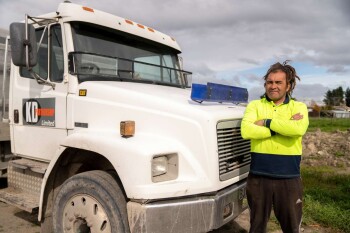
Clean-up champion Shayne Nuku with one of his trucks used to help remove debris from people’s properties
Along the way, Shayne has been a listening ear, a community connector, and someone who has seen the effects of the cyclone on people from all walks of life. “I met a man who had worked his whole life and never asked for anything. He was in a real bad way, so I took him to the marae and signed him up for whatever he was entitled to."
The New Zealand Disaster Fund contributed to Shayne’s community work through the Partnerships Grant Programme, allowing him to identify and offer his assistance to those who have struggled the most to clean up their homes.
“I’m now helping other people, thanks to Red Cross. They offer me a lamb or some beer, that’s how grateful they are. I say that’s ok – I’m funded by Red Cross. I was in a position to just rock up and offer help. It definitely helps.”
Read the full story: Helping those still cleaning up
By the numbers
The New Zealand Disaster Fund is being allocated across three programmes of work:
- The Response and Recovery Programme supported our immediate emergency response on the ground and is now helping communities recover by providing goods, services, and people. At this stage, approximately $7.3 million has been spent or committed in this programme, including approximately $6.3 million for Home Bundles.
- The Partnership Grants Programme provides grants to community organisations supporting community response and recovery. At this stage, approximately $14.7 million has been distributed in this programme.
- The Resilience Investment Programme will be focused on helping ensure communities are better prepared and supported in the event of another disaster. At this stage, approximately $2 million has been committed in this programme.
Total committed funds across all programmes: $24 million
Total donations: $27.5 million
Interest: $597,000
Note: Figures provided are as accurate as possible as at 13 November. Figures may change slightly in our annual reporting as we complete our audit process.
Partnership Grants Programme
This programme distributes grants to community organisations that are helping those affected. Supporting these organisations helps make sure response and recovery work is community-led and meets local needs.
Total approximate spent or committed: $14.7 million
Number of grants made: 166
See the full list of entities we have supported
Response and Recovery Programme
This programme supported our immediate emergency response on the ground and is helping communities recover by providing goods, services, and people. It is now focused on rolling out Red Cross Home Bundles.
Total approximate spent or committed: $7.3 million
Red Cross Home Bundles programme: Supplying new basic furnishings and household items to eligible households in need identified by our delivery partners. The programme is underway in Tāmaki Makaurau Auckland, Hawke’s Bay and Tairāwhiti. Home Bundles is a long-term programme because for a large number of people it will be many months before they can move back into their homes or find suitable new accommodation.
Bundles delivered: 50
Bundles orders being processed: 195
Red Cross response: Disaster Welfare and Support Team travel and equipment to support local Civil Defence Emergency Management Group requirements. Provision of psychological training to 1,001 people in 81 courses.
Equipment: Includes generators, dehumidifiers, clean-up kits, first aid kits and other items relating to emergency accommodation and other community needs.
See a breakdown of our spending under the Response and Recovery programme to date
Resilience Investment Programme
This programme provides funding to help communities prepare for, respond to, and recover from future emergencies and disasters as the impacts of climate change grow.
Total approximate spent or committed: $2 million
Number of grants made: 20
The next update will be published in mid-February.
Learn more
We’ve been around for more than 100 years. As the impacts of climate change increase the frequency and severity of weather-related emergencies across the country, we’ll keep being here.
The New Zealand Disaster Fund helps us to support communities to respond to, recover from, and prepare for disasters and emergencies in Aotearoa New Zealand.
If you want to stay up-to-date on how the New Zealand Disaster Fund is making a difference you can register for email updates.
Sign up for regular updates about the New Zealand Disaster Fund (redcross.org.nz)
Practical support and information to help you care for yourself and others after the recent flooding and Cyclone Gabrielle.
Caring for yourself and others after an emergency or disaster
Volunteer with us
We can’t do our work without the thousands of Kiwis from all corners of Aotearoa New Zealand who give their time and energy to volunteer.
We’re always on the lookout for dedicated people to join us in our humanitarian work. Join over 8,000 other humanitarians in New Zealand and volunteer today.
Find a volunteer role near you
Red Cross in your community
New Zealand Red Cross is part of your community. We have 16 offices around New Zealand including our head office in Wellington. You can join your local branch, group in over 40 cities and towns around New Zealand, or shop at one of our 50 retail stores.
New Zealand Red Cross has seven ‘areas’ across the country. Each area has its own area council, which is elected by the local Red Cross members.
There are nearly 50 branches of New Zealand Red Cross around the country. Branches have a hands-on local-community focus, and are run by volunteers.
Find out more about what we do in New Zealand
Support our work
Our emergency management work is funded through the generosity of donors. The New Zealand Disaster Fund is closed to new donations. A huge thank you to everyone who gave so generously to the Fund. People can still support our ongoing emergency management work across Aotearoa by donating to our Where the Need is Greatest fund.
Related stories
View the New Zealand Disaster Fund Six-Month Report - Feb to Aug 2023 (PDF, 5MB)
- Recovering peace of mind
- Helping those still cleaning up
- Staying with communities through long-term recovery
- Giving hope in cyclone-torn Hawke’s Bay communities
- Six months on: Red Cross commits $20 million in disaster relief
Header image: Our psychosocial advisor Sarah Gribbin chats with Te Karaka Community Co-Lead for Cyclone Recovery Pimia Wehi following a PFA training session.
